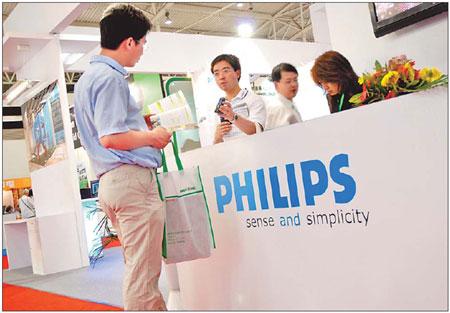
A Royal Philips Electronics NV booth at an exhibition in Beijing. China has been designated as one of the company's home markets. Philips is encouraging regional markets to learn from the country for faster growth. [China Daily]
Royal Philips Electronics NV has elevated China's status to that of a "home market", as it decentralizes management and encourages regional markets to learn from China how to obtain higher growth, according to a top company executive.
Frans van Houten, chairman, president and chief executive officer (CEO) of the 120-year-old company, said his first priority after taking the helm in April is to "create a sense of acceleration" in the Dutch company. China, with a growth rate of 20 percent last year, has become a model for the company's global operations.
"For the headquarters, you have to be more enabling, rather than controlling," said Van Houten, during his visit to China, which came less than two months after he took up his new role.
In the first quarter of 2011, China became Philips' second-largest market, with sales of 478 million euros ($673 million), higher than the 344 million euros registered in Germany and equal to one-third of its sales in the United States.
Philips has become the latest Fortune Global 500 company to adjust its management structure to tap opportunities in the emerging markets.
Intel Corp announced on Tuesday that Sean Maloney, one of its two executive vice-presidents, will be based in China as chairman of its operations in the country, which is set to overtake the United States to become the world's largest semiconductor market.
In November, the US industrial conglomerate General Electric Co (GE) appointed its vice-chairman John Rice to head its global growth and operations unit in Hong Kong.
For Philips in the current situation, strong growth is crucially important.
The company's stock price on the Euronext exchange has fallen 20 percent in the 12 months, while the AEX index, composed of Dutch companies that trade on Euronext Amsterdam, rose by almost 10 percent during the same period.
The company aims to raise the contribution from emerging markets to 40 percent in 2015 from 32 percent in 2010. China, one of its fastest growing markets, has become key to that ambition.
As a result of the strategy, Philips moved the global headquarters of its domestic appliances unit from Amsterdam to Shanghai in January.
The unit is expected to have more than 100 staff members, including those who transferred from the Netherlands and local recruits in Shanghai, but there are still some posts unfilled at present.
Van Houten said the unit actually enjoyed a good profit margin because it focuses on the premium segment, but when he asked his colleagues "Do we want stagnant growth with high profits or high growth in a bigger market", they all chose the latter.
"A global company has complicated structures and is slow in decision-making, but we want to empower and delegate so that we can move as fast as local companies do," he said.
The company is also planning that its kitchen appliances category will report to management in Shanghai, relocate its water and air category to the city, and install all end-to-end business capabilities under one roof in China.
Almost three years ago, Philips also made its Chinese operations a separate profit-and-loss center as a trial of its ability to develop in emerging markets, so the China-based team had their say on budgets, human resources and other decision-making capabilities.
The company, which competes against GE and Siemens AG in healthcare products and solutions, established a value-segment business unit in Shenzhen in April to develop and sell quality medical equipment at affordable prices to cost-sensitive customers, after acquiring a local medical equipment maker, Shenzhen Goldway Industrial Inc, in 2008.





